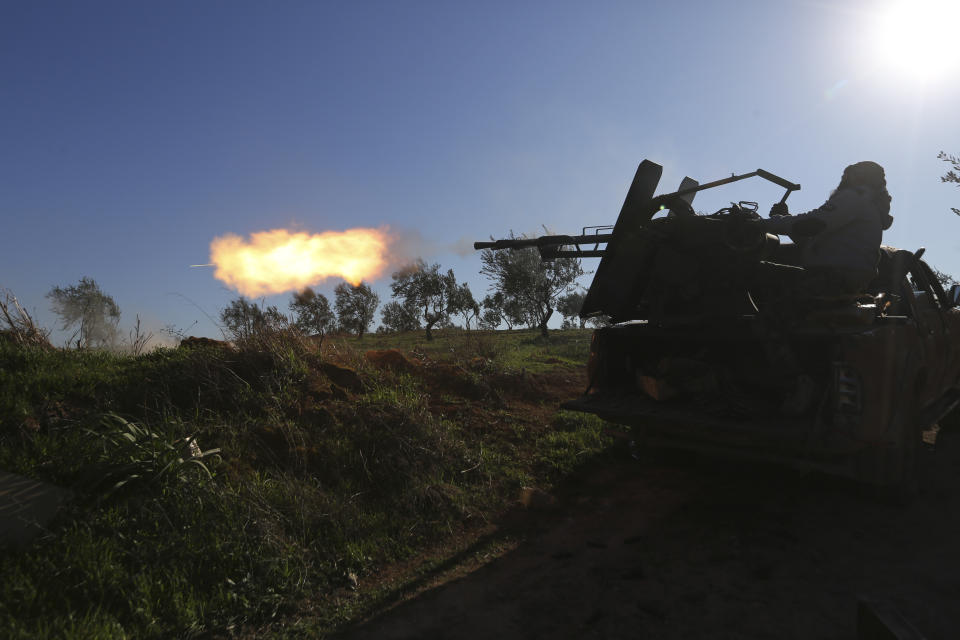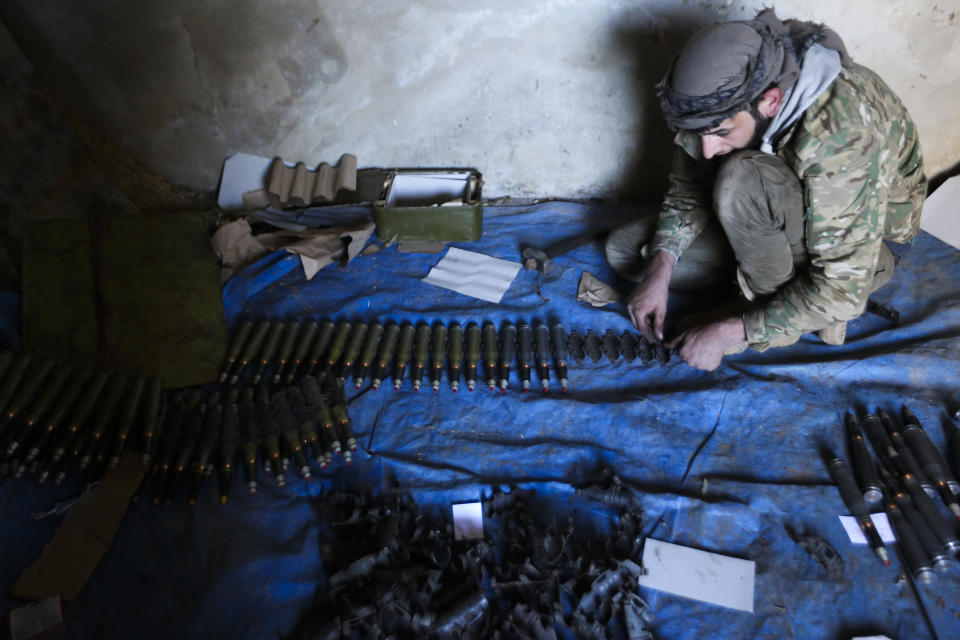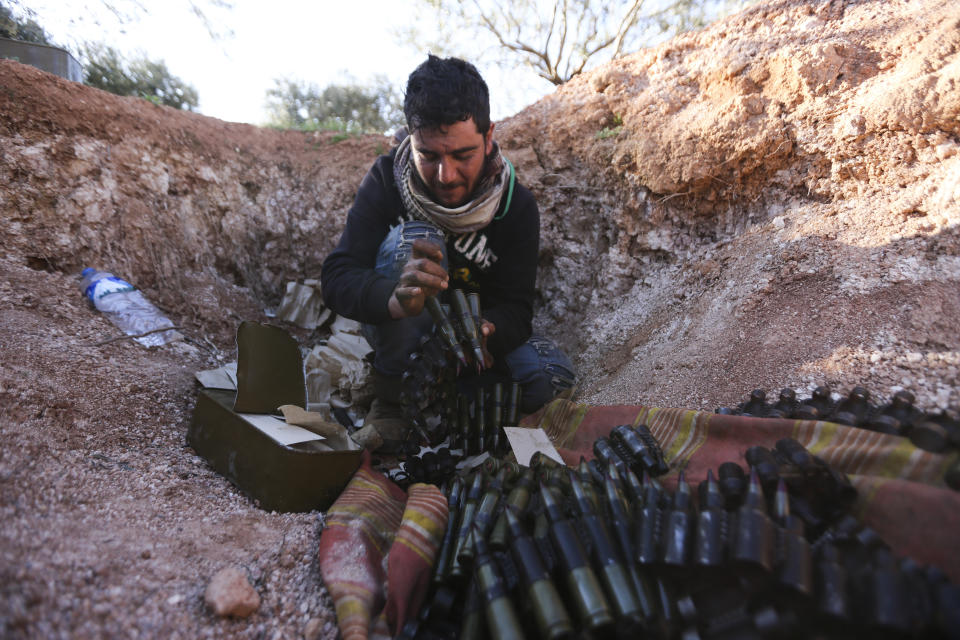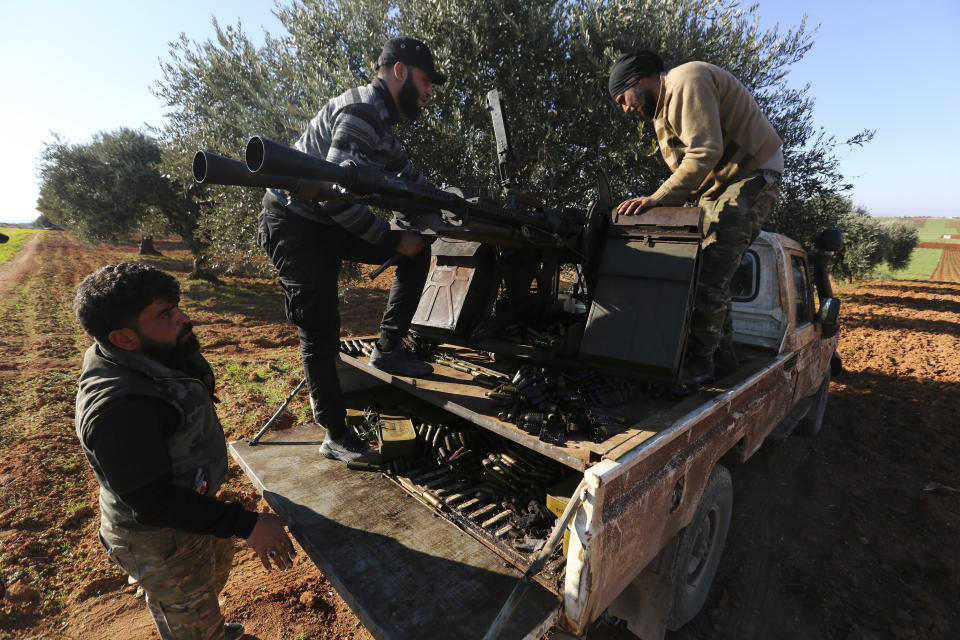Syrian army hits civilian sites in relentless Idlib campaign
BEIRUT (AP) — Syrian government forces bombed civilian targets in the northwestern Idlib province Wednesday, pushing ahead with a fierce military campaign that has sent nearly a million people fleeing from their homes and killed hundreds over the past three months.
Backed by Russian air power, President Bashar Assad's forces have over the past few days captured dozens of villages, including major rebel strongholds in the last opposition-held area.
U.N. spokesman Stephane Dujarric said the situation is increasingly dire following a spike in hostilities there in the last 48 hours.
Airstrikes were reported the previous day in 19 communities and shelling in 10 villages in Idlib and Hama, with at least 21 civilians, including five women and nine children, reportedly killed by airstrikes as well as ground-based attacks, he said.
The airstrikes also hit and damaged educational and medical facilities including Idlib Central Hospital and several facilities that were serving as a shelter for displaced people, Dujarric said.
He added that the U.N. is trying to expand cross-border aid deliveries to accommodate up to 100 trucks per day, but that needs on the ground "continue to outstrip the humanitarian community’s capacity to respond.”
More than 300 civilians have been killed since the beginning of December, when government troops launched a new military campaign to recapture Idlib, which is the last significant opposition-controlled region in the country. According to the U.N., 948,000 people have been displaced — an exodus of people fleeing their homes toward safer areas near the border with Turkey.
The fighting has triggered a humanitarian disaster, overwhelming already crowded refugee camps amid shortages in food and medicine. As in previous campaigns to recapture opposition-held areas, government troops bombed hospitals, medical centers, schools and other civilian infrastructure in a bid to subdue the local population, opposition activists and aid organizations said.
The international humanitarian group Doctors Without Borders, or MSF, said three hospitals near the frontlines that it supports received 185 wounded patients, including children, and 18 people who were dead on arrival, on Tuesday.
According to one of the surgeons who spoke to MSF, there were amputations and neurological injuries among the victims. “Along with the sound of bombings and the sound of sirens, people had panic attacks. It was a difficult, bloody day,” the surgeon, who was kept anonymous, said.
The Syrian Response Coordination Group, a relief group operating in the country's northwest, said that government forces struck numerous civilian targets in the past 24 hours, including eight schools, three medical centers, and several settlements where people displaced by the fighting had taken shelter.
The group's statement condemned the “silence by the international community” calling it an “open invitation” for Russian-backed government forces to continue their assault.
A doctor in Idlib who identified himself as Ihsan Eidi said that medical conditions were rapidly deteriorating in Idlib, adding that more than 50 hospitals and health centers have gone out of service over the past nine months.
"We had little equipment and most of it was damaged by the bombs, unfortunately," he said in the video released by a charity organization known as Islamic Relief Worldwide. He added that with the flow of displaced people in the cold weather, tent settlements have become overcrowded, which makes disease spread more easily.
At U.N. headquarters in New York, ambassadors from nine of the 15 Security Council nations requested a meeting Wednesday with Secretary-General Antonio Guterres to press for increased U.N. action on the escalating Idlib crisis. Syria's closest ally, Russia, was among the council nations that didn't attend.
Germany's U.N. Ambassador Christoph Heusgen said Idlib is the world's “worst humanitarian crisis” and it should be at the top of his agenda.
U.N. spokesman Stephane Dujarric said the secretary-general told the ambassadors he has two objectives: stopping the killings and getting humanitarian aid into Idlib.
“He’s been working towards these goals tirelessly through ongoing contacts with all the relevant parties," Dujarric said, including meeting Russian Foreign Minister Sergey Lavrov in Geneva on Monday.
The violence came as a Russian delegation was scheduled to arrive in Turkey Wednesday to resume talks aimed at easing tensions in the northwestern Idlib region.
Turkey and Russia back rival groups in the Syrian conflict and over the past weeks Ankara sent thousands of Turkish troops to Idlib. Clashes between Turkish and Syrian troops so far this month have left 16 Turkish soldiers dead.
Syrian opposition activists said government forces shelled a Turkish military convoy on a road near the northwestern village of Bara on Wednesday. There was no immediate word on casualties.
On Tuesday, Syrian troops shot down a Turkish drone over Idlib, saying it was carrying out a reconnaissance mission over a town recently captured by government forces.
A Syrian army statement said government forces captured, in addition to dozens of villages, some strategic hills deep inside the heavily fortified areas once held by insurgents. It said the villages captured include former strongholds such as Kafranbel, Has, Kfar Sajneh and al-Dar al-Kabira.
The announcement came a day after shelling and airstrikes in Idlib province left at least 16 civilians dead, including students and teachers in a school in the provincial capital, also called Idlib.
Also Wednesday, a car bombing wounded a Palestinian official near the capital Damascus, according to the Observatory and the pro-government Sham FM radio station. The name of the wounded official in the Damascus suburb of Qatana has not been made public.
____
Associated Press writer Albert Aji in Damascus, Syria, and Edith M. Lederer at the United Nations, New York, contributed reporting.

 Yahoo News
Yahoo News 




